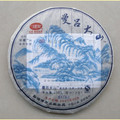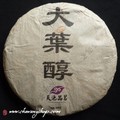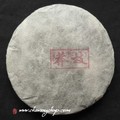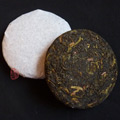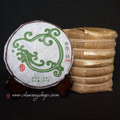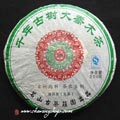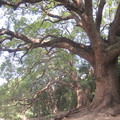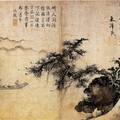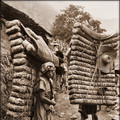Sheng - Raw Puerh
Čaj dle typu
Čaj dle oblastí
Čaj dle roků a další
2007 Menghai Tea Factory 7532
 0 hodnocení
0 hodnoceníPopis od prodejce : A classic recipe from Menghai, but the first production of 2007 (701). The highest grade material is always used for first batch productions and is highly sought after by collectors. Don't be confused this cake does not represent raw Pu-erh tea produced in 2007, rather it is a blend of premium Menghai area raw material from 2006. 7532 recipe is one of highest grade recipes used to compose raw tea cakes. The flavor is strong and pungent but that will mellow with age...
2007 Boyou "Man Lu Da Shan" Meng Song
 3 hodnocení, 1 komentář
3 hodnocení, 1 komentářPopis od prodejce: Boyou tea factory was started by yet another ex-Menghai tea blender. Boyou is well known for showcasing Menghai tea mountains and making Ripe Pu-erhs that rival Da Yi ripe teas. This particular tea cake was the Silver Prize winner at the 2007 Tea Culture Exhibition in Chengdu. It is a tea produced entirely from Meng Song mountain tea trees. Meng Song tea trees are well known for being a slightly smaller leaf varietal that was the result of cross-breeding several...
2012 Mangfei "Da Ye Chun" Early Spring Raw Puerh Cake 400g
 1 hodnocení, 1 komentář
1 hodnocení, 1 komentářTento vysoce kvalitní čaj ze starých čajovníků pochází z malého obchůdku v Yongde. Byl použit časně jarní materiál z čajovníků starých 80-300 let. Mangfei je jedna z vysokých hor Yongde. Byl použit tradiční proces „sha-qing“ (kill-green) v pánvi wok, sušen na sluníčku a poté pečlivě lisován do 400g koláčů. Vůně suchých lístků je silná a skvělá. Čajová polévka je žlutě zelená, jiskřivě průzračná a voňavá. Chuť je plná, silná s rychlým huigan. Na jazyku zanechává květinově nasládlou chuť....
2012 Mangzhi Huang Shan Cha Xiao Bing 200g
 2 hodnocení
2 hodnoceníThis tea came from Mangzhi mountain which is located in the west of Xiangming village Mengla county, and next to the Gedeng mountain. Mangzhi tea mountain once had a very glorious history, but suffered a setback in the local wars during the end of the Qing Dynasty. Early spring harvest from wild arbor tea trees. Traditional “sha-qing” (kill-green) processing in wok and sun-dried. Select maocha was pressed by stone to this small pretty cake. A pleasing depth of...
2012 Chawangpu Yiwu Zhangjiawan Gu Shu Xiao Bing Cha 200g
 0 hodnocení
0 hodnoceníOur Yiwu gushu for this year comes from an old village in Mansa area - Zhang Jia Wan Lao Zhai (张家湾老寨). Zhang Jia Wan Lao Zhai is a village more than 30km away from Yiwu town, and 13km from Zhang Jia Wan Xin Zhai(张家湾新寨), bordering Laos in the south. There is big area of ancient tea trees garden. Many of them was chopped down or burned around 1981. The stance to "gu cha shu" was very different at that time. Maocha cost only a fraction of today's price and old high trees were a...
2011 Mengmao Lao Shu Ye Sheng Xiao Bing 100g
 1 hodnocení, 1 komentář
1 hodnocení, 1 komentář2011 Spring harvest. This material come from Baoshan area, 2600 meters high mountain closed with Mengmao village. There is home for wild arbor big tea trees in ecological environment. This tea is 100% organic - more than 90% vegetation cover, it's a beautiful place free from pollution. Residence is known for undiscovered "paradise", "tea tree ancestor". This kind of wild tea has special purple color leaves. This tea is called three color tea. Fresh leaves are purple, dried tea is...
2006 Bailong TF Jinggu "Da Bai Hao" 357g
 0 hodnocení
0 hodnoceníJinggu area, it's famous for one of varietal tea trees – Da Bai Hao – “Big White tomentum”. The tea leaves and buds with dense white tomentum are larger than other tea variety. Its delicate aroma is sweet and appealing, its taste is thick mellow and unforgettable. Sun dried 2006 spring material, compression is medium. Sweet, light floral with comfortable mouth feel. This tea is good to drink now. Yunnan Jinggu Tea Mill was founded in1958 and used to be one of the six CNNP...
2012 Chawangpu Jingmai Gu Shu Xiao Bing Cha 200g
 1 hodnocení, 1 komentář
1 hodnocení, 1 komentářThis tea is from Jingmai Da Zhai, grown on the Da Ping Zhang area, and is considered some of the finest Jingmai tea available. Another famous tea village is Mangjing. The Mangjing tea taste more simple and bitter, therefore be sold at a lower price. Jingmai mountain is famous for middle/little leaf tea (中小叶种茶) which is popular for its sweet taste and floral aroma. Jingmai Da Zhai is one of the most famous village and has the biggest ancient tea tree garden in Jingmai mountain,...
2012 Myanmar - Beyond The Small Mengsong Mountain Gushu Xiao Bing 200g
 1 hodnocení
1 hodnoceníNezpracovaný materiál pro tento koláč pochází z vesnic Myanmaru (Barma), jde o severní hranici malého pohoří Mengsong. Čajovníky jsou staré zhruba 300 let a jsou neobhospodařovány. Místí lidé žijí v izolované oblasti, kde je velmi problematická doprava, proto je čaj přenášen přes hranici na zádech. Čaj není drahý, ale není jej snadné získat.
Témata
Citace
„A šaman už zahajuje svatební obřad. Čte úryvky z knihy čaje Meng Beng a opakuje slova boha čaje: ‚Zanechám-li svým dětem peníze nebo potravu, brzy jim nezbude nic. Zanechám-li jim čajovníky, je to dar, který bude trvat věčně, generaci za generací.‘“
Poslední příspěvky
21.06.2018 @ 09:54:35 - sypalino:
Ochutnávka po téměř dalších dvou letech, čajové lístky v suchém stavu stále pěkně voní,...
04.04.2017 @ 09:44:12 - sypalino:
Ochutnávka po 5-ti letech. Chuťově je teď takový převážně ovocný s lehkou...
30.08.2016 @ 08:53:24 - sypalino:
Po delší ochutnávka, jak se čaj vyvíjí. Suchý list si stále drží příjemné aroma, barva...
25.03.2016 @ 19:54:31 - sypalino:
Zdravím, čaj je podle mého soudu vynikající, jako sváteční pití vřele doporučuji, také...
25.03.2016 @ 11:01:46 - massilia:
Už jste někdo pil tento čaj? Celkem mne zajímá, uvažoval jsem o něm jako o takovém...
24.03.2016 @ 10:10:59 - Ondřej:
Hekai 15 mi z loňských Chawang čajů chutnal nejvíc. Loňské jaro prý bylo dobré a na...
23.03.2016 @ 18:58:57 - massilia:
Hmm, ten loňský Hekai jsem ještě nepil. To je tak dobrý, že stojí za celý tong? Obecně...
23.03.2016 @ 13:24:52 - Ondřej:
Nejprve jsem pořídil vzorek a hned poté si objednal jeden kousek. Připravoval jsem ho...
21.03.2016 @ 16:13:09 - massilia:
Zatím jsem ho vařil tak třikrát čtyřikrát. Jednou jsem při oplachu a prvních nálevech...
21.03.2016 @ 13:54:24 - massilia:
Osobně zůstávám na klasice: 4g/100 ml, vařící voda, časy...
Čaj dle typu
Čaj dle oblastí
Pomůžeme vám s výběrem čajů.
Máte rádi kvalitní sypané čaje?
My vám pomůžeme najít ten pravý.
Inspirujte se hodnocením ostatních milovníků čajů. Ve výběru vám pomohou hvězdičky.


Napište hodnocení čaje.
Ohodnoťe čaj, který právě pijete a pomožte dalším milovníkům čaje ve výběru toho pravého šálku.




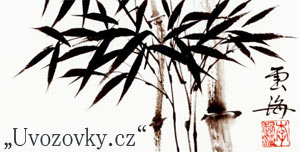


 Obchody
Obchody

